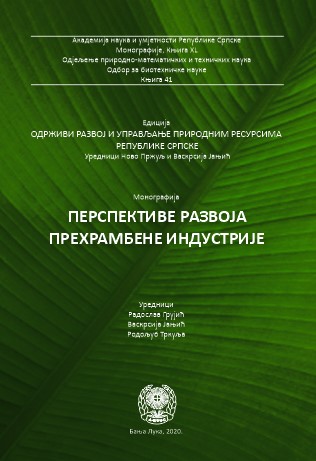Regulations and standards for quality and food safety
DOI:
https://doi.org/10.7251/EORU2002029NAbstract
Food products placed on the market must be safe to eat and have adequate quality. Food safety and quality are governed by the laws that each country brings to its market. In addition, legislation that has been adopted at regional and world level has a very important role in the international trade in food products. Nowadays, it is not possible to imagine international food trade without the existence of standards for particular product categories. Standards related to food products are a kind of limit for consumers regarding the quality, safety and authenticity of the food they eat. Efforts to harmonize different standards in order to facilitate and uniform the process of food production and trade are of great importance in the world. Enterprises producing food products in Republic of Srpska face many challenges today. Customers are increasingly demanding food quality and safety requirements, which are often more stringent than official legal standards for certain product categories. There has been a concentration of food trade on large trading systems whose bargaining power has increased sharply relative to food producers. In recent years, there have been a number of certification schemes for the certification of food products, which has had a major impact on not only the business of the companies in this field, but also on the evolution of the food quality and safety management system. In most cases, certification scheme owners are retail systems, traders associations, large multinationals with the support of certification bodies and traders associations. With this approach, export barriers to food products from Republic of Srpska are increasing significantly, as it is no longer necessary to meet only the legal requirements in the country where the product is sold, but also specific private standards prescribed by customers. All these efforts, on the other hand, are aimed at preventing incidental situations related to the possible poisoning of consumers with food products and the consequences that such cases can cause. In addition, there is a growing concern in the world for consumer health, which may be disturbed by the deliberate contamination of food, most often the result of ideologically motivated terrorist activities. Today, consumers want to be sure of what they eat and in terms of the origin, quality and all other attributes attributed to certain types of food. Modern standards related to integrated approaches to food quality and safety management also require measures to be taken to prevent food fraud that are motivated by the economic gain of fraudsters. In the legislation of Bosnia and Herzegovina, or the Republika Srpska, the application of the concept of establishing food security in the entire food supply chain, "from field to table", begins with the practical adoption of the Food Law of Bosnia and Herzegovina. In the meantime, the Food Law of the Republika Srpska was adopted, defining the obligations of food and feed business operators, as well as a system of official controls on food and feed. It is quite clear that the transition from one concept of food legislation, applicable in the Socialist Federal Republic of Yugoslavia (SFRY), to a modern proactive approach is still underway, and that the Republic of Srpska seeks to align its food legislation with the legislation that valid in the European Union (EU). Taking into account all the specific features of Bosnia and Herzegovina as a state and the competences defined by the Dayton Constitution at the entity level, the process of harmonization of legislation is more complex with EU legislation. In a number of cases, legislation is adopted at the state and entity levels for the same purpose, and sometimes the essential technical requirements in these regulations are different. This situation causes confusion, above all, for those who need to apply the requirements of the regulations in their business, which are the food business operators.
